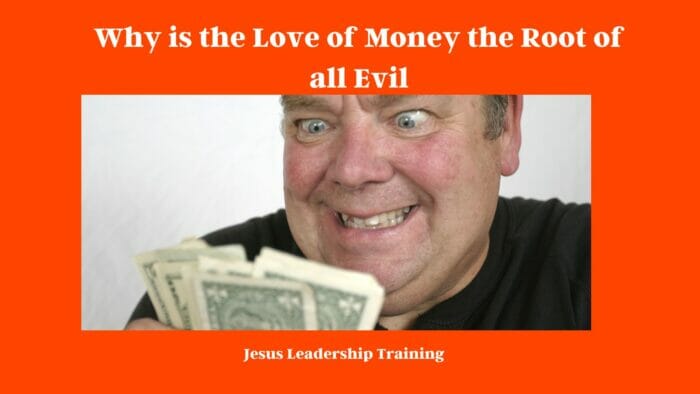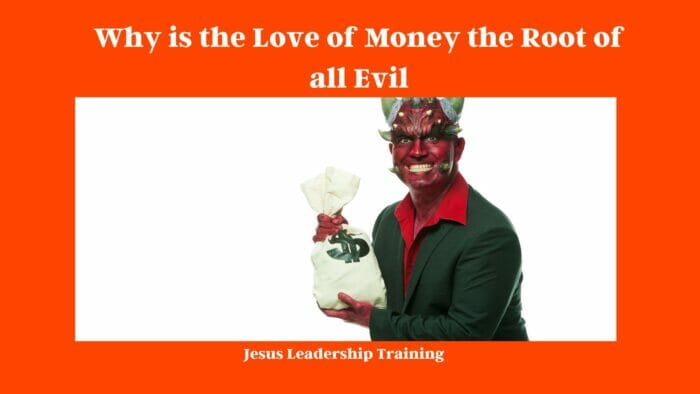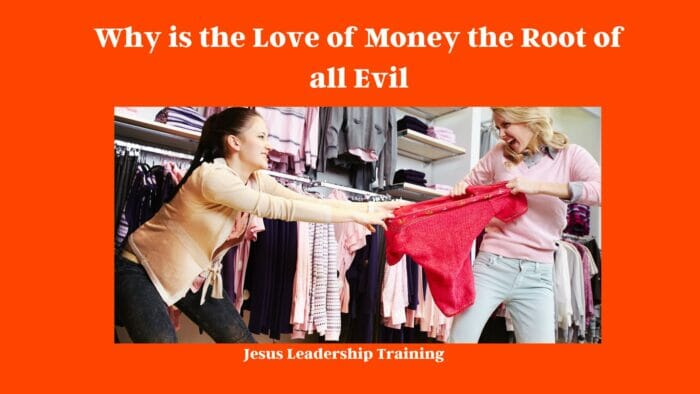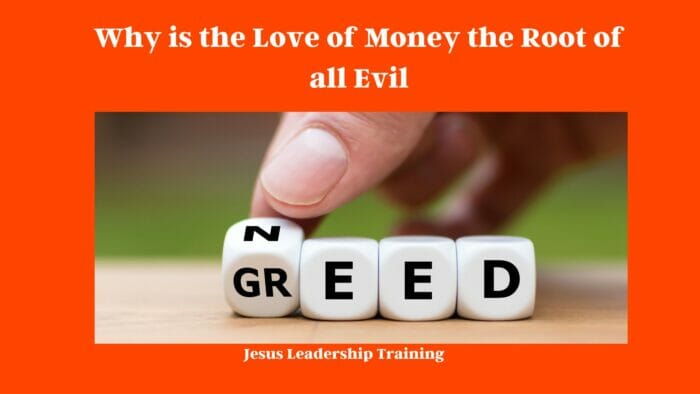Bible Verses on Greed and Corruption – Unravel the complex relationship between wealth, moral corruption, and societal well-being in our incisive article, “Why is the Love of Money the Root of all Evil.” This exploration probes the depth of human greed and its insidious impact on our actions, decisions, and integrity.
Table of Contents
Bible Verses on Greed and Corruption
Why is the love of money the root of all evil? This question poses a complex issue that has resonated through ages, across cultures, and within different societal frameworks. Here, we shall dissect this idea, understand its origins, and seek its relevance in today’s world.
here are some Bible verses on greed and corruption along with their text:
- 1 Timothy 6:10 (NIV):
- “For the love of money is the root of all kinds of evil. Some people, eager for money, have wandered from the faith and pierced themselves with many griefs.”
- Proverbs 15:27 (NIV):
- “The greedy bring ruin to their households, but the one who hates bribes will live.”
- Ephesians 5:3 (NIV):
- “But among you there must not be even a hint of sexual immorality, or of any kind of impurity, or of greed, because these are improper for God’s holy people.”
- Proverbs 28:25 (NIV):
- “The greedy stir up conflict, but those who trust in the Lord will prosper.”
- Luke 12:15 (NIV):
- “Then he said to them, ‘Watch out! Be on your guard against all kinds of greed; life does not consist in an abundance of possessions.'”
- Proverbs 11:28 (NIV):
- “Those who trust in their riches will fall, but the righteous will thrive like a green leaf.”
- 1 Corinthians 6:10 (NIV):
- “nor thieves nor the greedy nor drunkards nor slanderers nor swindlers will inherit the kingdom of God.”
- James 5:1-3 (NIV):
- “Now listen, you rich people, weep and wail because of the misery that is coming on you. Your wealth has rotted, and moths have eaten your clothes. Your gold and silver are corroded. Their corrosion will testify against you and eat your flesh like fire. You have hoarded wealth in the last days.”
- Proverbs 15:16 (NIV):
- “Better a little with the fear of the Lord than great wealth with turmoil.”
- Proverbs 28:16 (NIV):
- “A tyrannical ruler practices extortion, but one who hates ill-gotten gain will enjoy a long reign.”
- Hebrews 13:5 (NIV):
- “Keep your lives free from the love of money and be content with what you have, because God has said, ‘Never will I leave you; never will I forsake you.'”
- Proverbs 22:16 (NIV):
- “One who oppresses the poor to increase his wealth and one who gives gifts to the rich—both come to poverty.”
- Matthew 6:24 (NIV):
- “No one can serve two masters. Either you will hate the one and love the other, or you will be devoted to the one and despise the other. You cannot serve both God and money.”
- Proverbs 28:20 (NIV):
- “A faithful person will be richly blessed, but one eager to get rich will not go unpunished.”
- 1 Peter 5:2 (NIV):
- “Be shepherds of God’s flock that is under your care, watching over them—not because you must, but because you are willing, as God wants you to be; not pursuing dishonest gain, but eager to serve.”
These verses provide clear guidance and warnings about the dangers of greed and corruption while emphasizing the importance of contentment, righteousness, and trust in God.
Section I: Money and Morality – A Balancing Act (Evil)
The Love of Money: A Potential Slippery Slope
Money, in itself, isn’t evil. It is, in fact, a necessary tool for commerce and exchange. It’s the love of money — a fixation or obsession — that raises eyebrows. When we prioritize wealth over ethics, values, and human relationships, it becomes a catalyst for moral decay.

Reasons that the Love of Money is the Root of all Evil
here’s a table outlining the reasons why the love of money is often referred to as the root of all kinds of evil, based on biblical and ethical perspectives:
| Reasons | Descriptions |
|---|---|
| Distraction from God | The love of money can divert one’s focus from God and spiritual matters to material possessions. This conflicts with Matthew 6:24, where Jesus states, “You cannot serve both God and money.” |
| Greed | Excessive love of money often leads to greed. Greed, a sin, can cause people to act selfishly, unjustly, and harm others to accumulate wealth. (1 Timothy 6:10) |
| Corruption and Dishonesty | The love of money can compel people to lie, cheat, and steal. It can corrupt individuals and institutions, leading to unethical actions and social injustice. |
| Materialism | An excessive focus on money can lead to materialism, causing one to value physical possessions over spiritual growth and relationships. |
| Division and Strife | Money-related disputes often lead to division and strife within families, communities, and nations, causing conflict and destruction. |
| Idolatry | The love of money can turn into idolatry, where money becomes a false god that individuals worship and serve above all else, including the true God. This violates the first commandment in Exodus 20:3. |
| Loss of Contentment | The love of money often leads to dissatisfaction and a lack of contentment, causing perpetual restlessness and a loss of peace. |
It’s important to clarify that money itself isn’t inherently evil, but the love of money – or the excessive, greedy desire for it – can lead to harmful consequences. This is well summarized in 1 Timothy 6:10: “For the love of money is a root of all kinds of evil.”

Biblical Ways to avoid the sin of Love of Money
here’s a table showing some of the biblical ways to avoid the sin of the love of money:
| Biblical Principle | Scripture | Description |
|---|---|---|
| Generosity | Proverbs 11:24-25, 2 Corinthians 9:7 | Generosity counters greed. When we give freely to others, it breaks the power of money over us and reinforces that it is a tool to serve others, not ourselves. |
| Trust in God’s Provision | Matthew 6:31-33 | Trusting in God’s provision helps us avoid anxiety about material needs. By prioritizing the kingdom of God, we can be assured that our needs will be met. |
| Contentment | 1 Timothy 6:6-8 | Contentment is a powerful antidote to the love of money. Learning to be satisfied with what we have helps us resist the urge to constantly want more. |
| Stewardship | Luke 16:10-13 | By seeing ourselves as stewards or managers of God’s resources rather than owners, we are less likely to fall into the sin of loving money. We are called to use our resources wisely and for the benefit of others. |
| Avoid Debt | Romans 13:8 | Debt often comes from desiring more than we can afford, and it leads to slavery to money. The Bible encourages us to live within our means and to avoid the trap of debt. |
| Invest in Eternal Things | Matthew 6:19-21 | Investing in things with eternal value rather than storing up earthly treasures helps shift our focus away from the temporal nature of money and towards God’s eternal kingdom. |
These principles can serve as a guide to combat the love of money and prioritize God’s kingdom in our lives.
The Intersection of Wealth and Ethics
Is the quest for wealth inherently unethical? Absolutely not. However, when this pursuit blinds us to moral considerations, it sows seeds of destruction. This section explores the intricate relationship between wealth and ethics, examining how they can coexist harmoniously.
Obsession with Wealth: A Pathway to Corruption (Root)
The unbridled pursuit of money often leads to compromise in ethical values. This pursuit, driven by greed, can result in corruption, causing harm to society as a whole.
Section II: The Ripple Effect of Greed

A Social Perspective: Wealth Inequality (Evils)
Wealth inequality is a glaring testament to the destructive power of money. When the love of money overrides the principles of fairness and social justice, the result is a chasm of wealth distribution.
here’s a table that outlines the negative effects of greed on society:
| Negative Effects | Description |
|---|---|
| Wealth Inequality | Greed can exacerbate wealth inequality, with the rich becoming richer while the poor get poorer. This can create social unrest and increased poverty levels. |
| Corruption | When individuals in power are driven by greed, they may engage in corrupt practices such as bribery, embezzlement, and fraud, damaging the integrity of institutions. |
| Exploitation | Greed can lead to the exploitation of vulnerable populations, as some individuals or corporations may take advantage of others for financial gain. |
| Environmental Degradation | Driven by the desire for profits, corporations may overlook environmental regulations, leading to pollution, deforestation, and other forms of environmental harm. |
| Consumerism | Greed promotes a culture of consumerism, where people are encouraged to constantly buy and consume, often beyond their needs or means. This can lead to financial stress and other societal problems. |
| Lack of Empathy | In a greed-driven society, empathy and compassion can diminish as people become more focused on accumulating wealth than helping others. |
| Crime | High levels of greed can lead to increased crime rates as individuals might resort to illegal means to acquire wealth. |
| Economic Instability | Greed can lead to risky financial behaviors and decision-making, which can result in economic crises, as seen in the 2008 financial crisis. |
These effects highlight the negative impacts that greed can have on a society, reinforcing the importance of values such as generosity, compassion, and fairness.
The Environmental Cost of Greed
Our pursuit of wealth also has unintended consequences for our environment. The relentless quest for profit often sidelines the imperative of environmental sustainability, leading to widespread destruction.
Greed and Political Corruption
The love of money has far-reaching implications in the realm of politics. When personal gain overrides public interest, political corruption arises, undermining the foundations of democracy.
Section III: Mitigating the Downside of Wealth
Responsible Wealth Accumulation
The quest for wealth isn’t inherently evil; it’s the approach that matters. This section underscores the importance of ethical wealth accumulation and its role in promoting societal welfare.
The Power of Philanthropy
Philanthropy demonstrates that wealth, when used constructively, can be a force for good. This section explores how the love of money, when tempered with altruism, can help alleviate societal challenges.
here’s a table that proposes different ways wealth can be utilized for philanthropic purposes:
| Philanthropic Use of Wealth | Description |
|---|---|
| Charitable Donations | Wealthy individuals can contribute funds to nonprofit organizations that are making a positive impact on society. This can range from local charities to global humanitarian organizations. |
| Establishing Foundations | Many wealthy individuals choose to start their own foundations, allowing them to dictate how their money is used to address specific societal or global issues they are passionate about. |
| Scholarships and Grants | Wealth can be used to fund scholarships and grants for deserving students who may not have the financial means to pursue higher education or research opportunities. |
| Community Development Projects | Wealth can be invested in projects aimed at improving communities, such as affordable housing, parks, and other public services. |
| Microfinancing | Microfinancing provides small loans to low-income individuals or communities, enabling them to start businesses, improve their living conditions, and boost local economies. |
| Investing in Social Enterprises | Wealth can be used to invest in businesses that balance profit-making with societal benefits, supporting innovation and entrepreneurship that aligns with societal needs and challenges. |
| Supporting the Arts | Philanthropists can sponsor art galleries, theater productions, music festivals, and other cultural institutions or events, contributing to cultural richness and diversity. |
| Endowing Academic or Medical Institutions | Wealth can be used to fund universities, research institutions, hospitals, or specific departments within them, contributing to advancements in education, science, and healthcare. |
By investing wealth in these ways, individuals can make significant positive contributions to society and foster a culture of giving.
Balancing Wealth and Wellbeing
Balancing the pursuit of wealth with personal wellbeing and integrity is key to mitigating the potential downsides of wealth accumulation. This section provides practical insights on maintaining this balance.
The love of money is the root of all evil, according to the Bible. This phrase is often used to describe the dangers of greed and how it can lead to immoral behavior. But what exactly does this phrase mean? And how can we avoid the pitfalls of the love of money and live a life of contentment and satisfaction?
What does the love for money is the root of all evil mean?
The love of money is the root of all evil is a phrase found in the Bible in 1 Timothy 6:10 which states, “For the love of money is a root of all kinds of evil. Some people, eager for money, have wandered from the faith and pierced themselves with many griefs.” This phrase is often used to describe how greed can lead to immoral behavior and put people’s spiritual welfare at risk.
What is an example of money is the root of all evil?
An example of money being the root of all evil would be when someone is so focused on gaining wealth that they begin to make unethical and immoral decisions to get ahead financially. They may lie, cheat, steal, or do anything else they think will bring them more money, regardless of the consequences.
here’s a table that showcases biblical examples of individuals who succumbed to greed:
| Biblical Figure | Incident and Reference | Description |
|---|---|---|
| Judas Iscariot | Betrayal of Jesus – (Matthew 26:14-16) | Judas Iscariot, one of Jesus’ twelve disciples, agreed to betray Jesus to the religious leaders for thirty pieces of silver, showing greed’s power to corrupt even those who are close to righteousness. |
| Achan | Sin against the Covenant – (Joshua 7:1) | Achan, during the Battle of Jericho, kept a portion of the spoils for himself despite God’s explicit command not to. His greed led to his death and the suffering of others in his community. |
| Ananias and Sapphira | Lie to the Holy Spirit – (Acts 5:1-11) | Ananias and his wife Sapphira sold a piece of property and, instead of giving all the proceeds to the apostles as they claimed, kept a portion for themselves. Their greed and deceit led to their immediate death. |
| King Ahab | Naboth’s Vineyard – (1 Kings 21:1-16) | King Ahab, driven by greed, arranged the murder of Naboth in order to take possession of his vineyard. His greed led to divine judgement upon his household. |
| Gehazi | Leprosy of Gehazi – (2 Kings 5:20-27) | Gehazi, the servant of the prophet Elisha, pursued Naaman for personal gain after Elisha had healed Naaman of his leprosy for free. His greed led to him being struck with leprosy. |
These stories provide profound lessons about the consequences of greed and its destructive nature, reinforcing the biblical message that “the love of money is a root of all kinds of evil.” (1 Timothy 6:10)
What are the disadvantages of love for money?
The disadvantages of the love of money are numerous. The most obvious is that it can lead to immoral behavior. Greed can also lead to debt, loss of relationships, and feelings of unhappiness and dissatisfaction. Additionally, many people who focus on money too much may find that they are unable to enjoy life’s simple pleasures, like spending time with loved ones, because of their obsession with money.
What is excessive love of money called? (paul david)
Excessive love of money is often referred to as greed. Greed is an excessive desire for wealth or material possessions and it can lead to unethical and immoral behavior. Greed can also lead to feelings of unhappiness and dissatisfaction, as well as debt and loss of relationships.
Does the Bible actually say money is the root of all evil? (david tripp)
No, the Bible does not actually say money is the root of all evil. The phrase “the love of money is the root of all evil” is found in 1 Timothy 6:10, which states “For the love of money is a root of all kinds of evil. Some people, eager for money, have wandered from the faith and pierced themselves with many griefs.” This phrase is often used to describe how greed can lead to immoral behavior and put people’s spiritual welfare at risk.
What does the Bible mean by love of money? (bible trivia)
The Bible means the love of money is an excessive desire for wealth or material possessions. Greed can lead to unethical and immoral behavior, as well as feelings of unhappiness and dissatisfaction, debt, and loss of relationships. The Bible warns us to avoid the love of money, and instead focus on leading a life of service and contentment.
What did Jesus say about money in the Bible?
Jesus talked extensively about money in the Bible. He said, “No one can serve two masters. Either you will hate the one and love the other, or you will be devoted to the one and despise the other. You cannot serve both God and money.” (Matthew 6:24). Jesus also said, “Do not store up for yourselves treasures on earth, where moth and rust destroy, and where thieves break in and steal. But store up for yourselves treasures in heaven, where moth and rust do not destroy, and where thieves do not break in and steal.” (Matthew 6:19-20).
Why does the Bible say money answers all things?
The Bible does not actually say that money answers all things. This phrase is often misattributed to the Bible, when in fact it is actually a quote from Ecclesiastes 10:19, which states, “Money answers all things.” This phrase is often used to describe how having money can make life easier, but it is important to remember that money cannot solve all problems.
Why the lack of money is the root of all evil?
The lack of money is not the root of all evil. Greed and excessive love of money is the root of all evil, according to the Bible. Greed can lead to unethical and immoral behavior, as well as feelings of unhappiness and dissatisfaction, debt, and loss of relationships. The Bible warns us to avoid the love of money, and instead focus on leading a life of service and contentment.
Is money the key to happiness?
No, money is not the key to happiness. Money can make life easier and more comfortable, but it cannot buy true happiness. True happiness comes from meaningful relationships, a sense of purpose, and a life of service to others. Money can be a great tool, but it should not be the focus of our lives.
FAQs
- What does “The love of money is the root of all evil” mean?
- It means that an unhealthy obsession with wealth can lead to moral compromise and harmful consequences.
- Is the pursuit of wealth inherently evil?
- No, it’s the obsession with wealth at the expense of ethics and integrity that’s problematic.
- What are the impacts of the love of money on society?
- It can lead to wealth inequality, environmental degradation, and political corruption.
- How can we balance the pursuit of wealth with ethical considerations?
- By prioritizing ethical considerations in our decisions, being conscious of the impact of our actions, and using wealth constructively.
- What is responsible wealth accumulation?
- It’s the process of amassing wealth in an ethical, sustainable, and socially responsible manner.
- Can the love of money be a force for good?
- Yes, if tempered with altruism and used for philanthropic efforts, it can help address societal challenges.
Other Key Terms
- paul david
- judas iscariot
- money box
- david tripp
- bible trivia
- insurance money
- rich christians
- piper jun
- rich paul
- desiring god
- sign language
- rich
- church
Best Bible Encyclopedias and Dictionaries
Below is a table featuring some highly regarded Bible Encyclopedias and Dictionaries along with their publishers and websites where they can be found or purchased.
| Title | Publisher | Website |
|---|---|---|
| The International Standard Bible Encyclopedia | Eerdmans | Eerdmans |
| Zondervan’s Pictorial Bible Dictionary | Zondervan | Zondervan |
| Easton’s Bible Dictionary | Thomas Nelson | Thomas Nelson |
| Holman Illustrated Bible Dictionary | B&H Publishing Group | B&H Publishing Group |
| The New Unger’s Bible Dictionary | Moody Publishers | Moody Publishers |
| HarperCollins Bible Dictionary | HarperOne | HarperOne |
| Vine’s Complete Expository Dictionary of Old and New Testament Words | Thomas Nelson | Thomas Nelson |
You can generally find these resources on the publishers’ websites, as well as other online book retailers such as Amazon or Christianbook. It’s always good practice to confirm availability and review additional details on the specific websites or other reliable online bookstores.
Final Thoughts: The Love of Money – A Double-edged Sword
While it’s true that the love of money can breed evil, it’s also crucial to remember that money in itself isn’t inherently bad. The key lies in balancing the pursuit of wealth with ethical considerations and using wealth to promote societal well-being. In this complex interplay, our moral compass serves as our guide.



